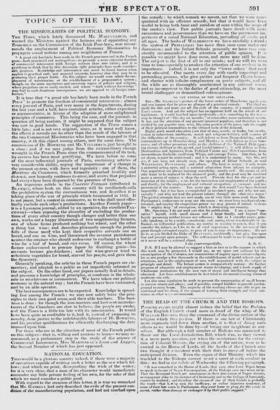TOPICS OF THE DAY.
THE MISSIONARIES OF POLITICAL ECONOMY.
THE Times, which lately denounced Mr. Msocur.nocn, and waned the Ministers against the heinous sin of appointing any Eeonemist on the Commission of the Irish Poor-laws, now recom- mends the employment of Political Economy Missionaries to proragate sound notions among our neighbours of France.
A great stir has lately been made in the French provinces and in the French press—both provincial and metropolitan—to promote a more extensive freedom 4-commercial intercourse with threign nations than now exists ; and it is gratifying- to think that by this discussion right principles have made consider- able progress. Knowledge and informaticn can never be found barren when applied to practical ends and material interests, however slow they may be in producing their proper fruits. On this subject we would even admit the em- phryment of missionaries, or the establiAment of a propagandist system ; though, on the more mysterious and uncertain topics of politics and religion, where prejudices are so easily excited, and where " faith without knowledge " may lead to such disastrous consequences, we are opposed to all foreign inter- ference."
It is true that "a great 'stir has lately been made in the French Press" to promote the freedom of commercial intercourse : almost every journal of Paris, and very many in the departments, during the last year and a half, have contained articles, either expository or argumentative, in favour of the adoption of more enlightened principles of commerce. This being the case, and the journals in question all being zealous, it might be supposed that the subject was now in good hands. The suggestion of the Times comes a • little late; and is not very original, since, as it must well know, the effects it records are no other than the result of the labours of the two Commercial Missionaries who have been engaged in that country, with this object among others, now for some time. The commission of Dr. BOWRING and Mr. Vnitigas is just brought to it close; and if we may judge from the extraordinary change wrought in the French Press since the commencement of its task, its success has been most gratifying. We have before us some of the most influential journals of Paris, containing articles of very considerable ability, urging the importance of a change in the present system, with force and ingenuity : one of them, the Moniteur du Commerce, which formerly preached hostility and distrust, now honestly confesses its error, and avows that prejudice had everywhere been dispersed by the presence of facts. An ingenious article in the Courrier Francais (attributed to BLANQUI, whose book on this country will be recollected) calls the prohibitive system the customhouse war, and describes it as taking place of the war of principle which terminated in -1815. It is not peace, but a contest in commerce, as to who shall most effec- tually exclude each other's productions. Another French paper— it is a Lyonnese journal, edited by an operative, the excellent FAL- cgaNx€T—when exposing the absurdity of excluding the produc- tions of every other country though cheaper and better than our own, works out a happy illustration of two neighbouring farmers, one of whose farms produced nothing but wheat, and the other n thing but wine; and describes pleasantly enough the jealous folly of these men who kept their respective servants one on bread, and one on wine, and threatened the severest punishment against the retainer who should endeavour to exchange a bottle of vine for a loaf of bread, and vice versa. Of course, the wheat farmer endeavoured to procure liquor by distilling grain—his servants became gin-drinkers; and the wine-grower tried to substitute vegetables for bread, starved his people, and gave them the dysentery.
Generally speaking, the articles in these French papers are ele- mentary, and adapted to a public as yet imperfectly informed on the subject. On the other hand, our papers usually deal in details, and presume a knowledge of principles, or condemn in the whole- sale as mischievous or inconsistent. We have taken our political economy in the natural way ; but the French have been vaccinated, and by an able operator. The best consequences are to be expected. Knowledge is spread- ing fast among the French : we may now safely leave the prin- ciples to their own good sense, and their able teachers. The busi- ness is (lone: for though the iron-masters and beet-mot-manufac- turers of the Chambers are slow to believe, the people are awake,
and the Times is a little too late with its missionaries. It would hive been quite as creditable to it, had it, instead of proposing its novelty, done justice to the indelhtigable labours of Dr. BOWRING, and his peculiar qualifications for efficiently discharging the duty imposed upon him.
For those who are in the situation of most of the French public on this subject—that is, willing and anxious to learn—we may re-
commend, as a preliminary step in the study of the science of Co in me c ia I Intercourse, Miss MARTINEAU'S Loom and Lugger, the Second Number of which has just appeared.
















 Previous page
Previous page